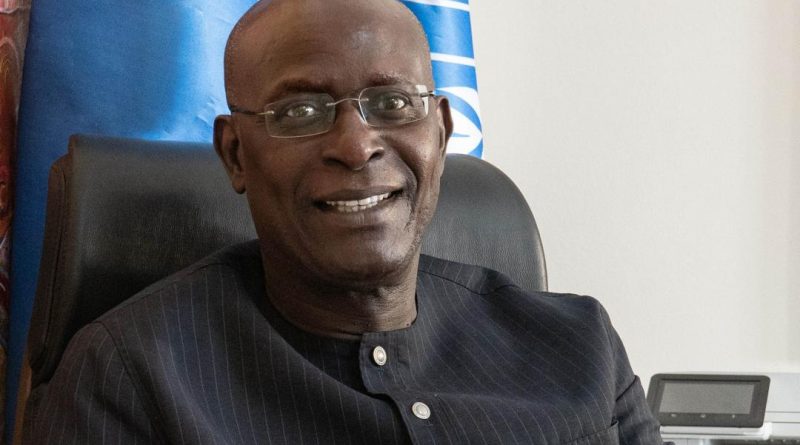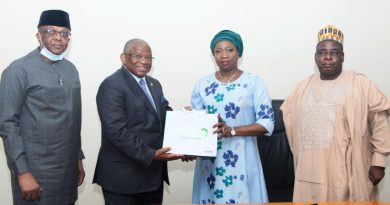Mohammed Fall: Effect Of Climate Change On Nigeria, Not Just Environmental Injustice But Moral Failure
By Bukar BOLORI
The United Nations Resident and Humanitarian Coordinator in Nigeria, Mohammed Fall, has described the effect of climate change on Nigeria and the rest of Sub Saharan Africa as more than an environmental injustice but a moral failure.
Speaking at the Regional Africa Human Rights Academic Network Conference organised in Abuja on Wednesday, by the Raoul Wallenberg Institute and the University of Nigeria, Faculty of Law with the theme “Human Rights, Environment, and Climate Change: Access to Environmental and Climate Justice within the Regional and Sub-Regional Human Rights Systems in Africa,” Fall said: “The climate crisis is more than an environmental issue—it is a human rights emergency. Across Africa, rising temperatures, extreme weather events, and environmental degradation disproportionately impact those in vulnerable situations, including women, the elderly, youth, and persons with disabilities.”
He decried that: “Those who contribute the least to climate change bear its worst consequences. This is an injustice.Sub-Saharan Africa produces less of the world’s greenhouse gases, yet it suffers the worst effects of climate change. This is more than an environmental injustice—it is a moral failure.
“The children of tomorrow will grow up in a world damaged by choices they never made. They will bear the cost of a crisis they did not create. This is not just unfair; it is a deep betrayal of future generations.Land loss, food insecurity, water scarcity, and displacement resulting from climate change are daily realities for millions, including in Nigeria. This human rights crisis deepens inequalities, exacerbates poverty, and threatens peace and stability. When environmental degradation denies people access to clean water, food, and livelihoods, it violates fundamental human rights—the right to life, health, and dignity.”
He noted that: “Recognizing this, the UN General Assembly in 2022 adopted a landmark resolution affirming the right to a clean, healthy, and sustainable environment as a universal human right. This resolution reinforced global commitment to environmental justice, stating unequivocally that climate change and environmental degradation are among the most pressing threats to humanity’s future. It also emphasized that achieving this right requires the full implementation of multilateral environmental agreements under international environmental law. This framework underscores both the urgency of action and the legal basis for protecting this fundamental right.”
He said: “Nigeria, as Africa’s most populous nation and economic powerhouse, stands at a critical crossroad. The country is at the frontlines of climate change, facing severe desertification in the north, erosion and rising sea levels in the south, and erratic weather patterns disrupting agriculture and livelihoods. Every year, we see the devastating impact of floods which are caused or worsened by climate change. The devastation occurred last year by flooding in the northeast left hundreds of people dead or unaccounted for and thousands displaced, in addition to severely damaging infrastructure.If unaddressed, these challenges will escalate conflicts over land and resources, increase displacement, and strain governance and security. Yet, Nigeria is also a nation of resilience, innovation, and potential.
“Nigeria has a unique opportunity to champion environmental justice and climate action as fundamental human rights. By integrating climate justice into legal and policy frameworks in a manner consistent with Nigeria’s human rights obligations, development can be sustainable, just, inclusive, and rights-based.”
He said: “The United Nations stands firmly with Nigeria in addressing these challenges. Through the UN Sustainable Development Cooperation Framework, solutions are being driven in alignment with the Sustainable Development Goals (SDGs), particularly SDG 13 on Climate Action, SDG 16 on Peace, Justice, and Strong Institutions, and the six transitions accelerating progress toward 2030.”
Earlier, the Executive Secretary of the National Human Rights Commission (NHRC), Dr. Tony Ojukwu had said that: “At the National Human Rights Commission (NHRC), we fully recognize that climate change is not just an environmental issue; it is a human rights crisis that threatens lives, livelihoods, and the very essence of human dignity. The impact of environmental degradation and climate change on human rights across the globe, and indeed, within our own continent can never be over-emphasised. These impacts are no longer a distant threat but a present-day reality, with far-reaching consequences for vulnerable communities, particularly those who are marginalized and impoverished.”
He added that: “Africa contributes the least to global carbon emissions, but yet bears a disproportionate burden of climate change. Rising temperatures, erratic rainfall, desertification, and extreme weather events are no longer distant threats—they are happening now. In Nigeria, floods displace thousands annually, droughts threaten food security, and rising sea levels put coastal communities at risk. From the north to south of Nigeria, the movement of pastoralists in search of grazing land has exacerbated conflicts and insecurity. The impacts of climate change have dire consequences for human rights, including the rights to life, health, food, water, and shelter.”
He said “climate justice demands that those who suffer the most from climate change receive adequate support and protection. Governments and institutions, including the National Human Rights Institutions, must take decisive action to safeguard human rights in the face of climate change.”




